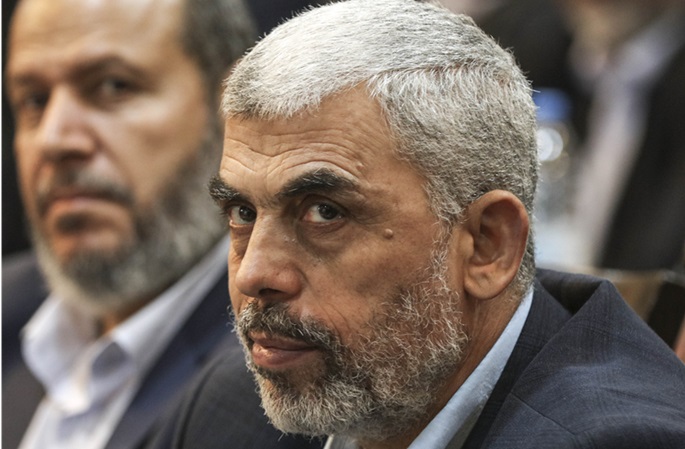Obscuring prospect of ceasefire talks after killing of Sinwar
Published : 18 Oct 2024, 13:20
The Israeli military confirmed on Thursday that Hamas leader Yahya Sinwar was killed in an operation in southern Gaza at a time as the Israeli-Palestinian conflict passes its one-year mark with peace talks stalled, reported Xinhua.
Shortly after Sinwar's killing, U.S. President Joe Biden called Israeli Prime Minister Benjamin Netanyahu to discuss "how to use this moment to bring the hostages home and to bring the war to a close with Israel's security assured and Hamas never again able to control Gaza," according to the White House.
Yet Netanyahu declared that Israel had "settled the score," but vowed to continue its military operations in Gaza until all hostages were returned.
The death of Sinwar, who succeeded Ismail Haniyeh as the leader of Hamas after the latter was assassinated in a suspected Israeli strike in Tehran in late July, has fueled speculation about his successor, who will need to negotiate through mediators to revive talks for lasting peace in Gaza and a potential hostage swap deal with Israel.
GAZA'S MILITARY STRONGMAN
Sinwar, 62, was freed in a 2011 prisoner swap with Israel after serving over 20 years in prison.
He took over leadership of Hamas' military wing, the al-Qassam Brigades, in 2013, coordinating efforts between Hamas' political bureau and the Brigades' leadership. In February 2017, he was elected leader of Hamas in the Gaza Strip through an internal election and re-elected in 2021 for a second four-year term. Sinwar was known as a cautious figure who rarely spoke publicly.
He was widely regarded as a hardliner within the Palestinian Islamic Resistance Movement (Hamas), believing that armed struggle was the only path to establishing a Palestinian state.
He became the top target of Israel's military in Gaza, launched after Hamas' surprise attack on southern Israel on Oct. 7, 2023, killing around 1,200 people and taking approximately 250 hostages.
Despite a year of heavy Israeli bombardments and ground military operations in Gaza, which have killed over 42,000 people, mostly civilians, as well as high-ranking Hamas military commanders, Sinwar remained elusive. He was believed to have directed military attacks on Israel and ceasefire negotiations from a complex network of tunnels beneath Gaza and other hidden locations.
Israeli media reported that Sinwar was killed on Thursday during a ground operation in Rafah, the southernmost city in the Gaza Strip, during which Israeli soldiers killed three militants and retrieved their bodies.
His identity was confirmed through DNA tests, using samples Israel had retained from his time in prison.
There was no immediate comment from Hamas, which has lost two of its most senior leaders within three months.
Italian Foreign Minister Antonio Tajani said he hoped that "the disappearance of the Hamas leader will lead to a ceasefire in Gaza."
"Now's the time to move on. ... Move toward a cease-fire in Gaza, make sure that we move in a direction that we're able to make things better for the whole world," Biden said to reporters upon landing in Berlin on Thursday.
ISRAEL TO CONTINUE WAR
After Sinwar's death, Netanyahu stated that his killing offered a chance for peace in the Middle East but vowed to continue Israeli military operations in Gaza until all hostages were returned.
At least 97 hostages taken on Oct. 7, 2023, are still believed to be in Gaza, with around a third, or 33, presumed dead, according to Israeli estimates.
Protests have erupted in Israel over the past few months, demanding that the government negotiate with Hamas to secure the release of the hostages. However, efforts to reach a ceasefire agreement and a hostage-for-prisoner deal between Israel and Hamas, despite rounds of talks brokered by the United States, Qatar, and Egypt over the past months, have failed.
Over the past year, there have also been significant developments in the broader regional conflict, including Hezbollah striking Israeli targets to show support for Palestinians, Houthi forces in Yemen attacking ships linked to Israel and its Western allies, open confrontations between Iran and Israel, frequent attacks by Iraqi militias on Israeli targets, and regular Israeli airstrikes in Syria.
In a major escalation of the Gaza war, Israel has intensified its bombardments on Hezbollah targets in Lebanon and initiated ground operations in the country since mid-September.
The gravity of the regional tension will require Sinwar's successor to oversee Hamas' military activities amid ongoing combat with Israeli soldiers in the Gaza Strip, make decisions about the future of ceasefire and hostage swap negotiations, and coordinate with regional allies.
Samer Anabtawi, a political analyst from Nablus in the West Bank, believes that Sinwar's death will significantly impact Hamas and its strength.
"Choosing a successor of Sinwar is not easy at this time," he said, adding that he believes Hamas leadership may be collective rather than centered around a designated general leader.
Anabtawi believes that while negotiations for a ceasefire deal will not be adversely affected, progress is unlikely to be quick in Sinwar's absence.
Ahmad Rafiq Awad, a political science professor at Al-Quds University in East Jerusalem, noted that Hamas will need more time to choose a successor.
Awad added that Sinwar's death would affect the ongoing conflict involving Israel, Lebanon, and Iran, emphasizing the situations are interconnected.


